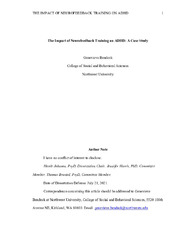| dc.contributor.advisor | Johnson, Nicole | en |
| dc.contributor.author | Bendeck, Genevieve | en |
| dc.date.accessioned | 2021-11-09T22:53:59Z | |
| dc.date.available | 2021-11-09T22:53:59Z | |
| dc.date.issued | 2021-07-21 | en |
| dc.identifier.uri | archives.northwestu.edu/handle/nu/57375 | en |
| dc.description.abstract | This paper evaluates the impact of neurofeedback training on ADHD. Throughout the years, many researchers have tried to assess the impact of neurofeedback training on ADHD; however, studies have suffered from shortcomings in the methodological application and a lack of proper control groups. This study aims to address some of the aforementioned concerns. Questions addressed in this study include: (a) Is neurofeedback an effective intervention for ADHD? (b) Will participants significantly improve their symptoms with the combination of neurofeedback training and treatment as usual? I hypothesized the addition of neurofeedback training would yield more favorable results in reducing symptoms of ADHD, such as impulsivity, attention, and hyperactivity, than pharmacological treatment alone in adolescents 11-17 years old. | en |
| dc.format.extent | 106 pages | en |
| dc.format.medium | PDF | en |
| dc.language.iso | en | en |
| dc.publisher | Northwest University | en |
| dc.rights | This original work is protected by copyright. Copyright is retained by the author(s). Works may be viewed, downloaded, or printed, but not reproduced or distributed without author(s) permission. | en |
| dc.rights.uri | http://archives.northwestu.edu/page/copyright | en |
| dc.subject | Neurofeedback | en |
| dc.subject | Attentive-deficit hyperactivity disorder | en |
| dc.title | The Impact of Neurofeedback Training on ADHD: A Case Study | en |
| thesis.degree.name | Doctor of Psychology in Counseling Psychology | en |
| thesis.degree.level | Doctoral | en |
| thesis.degree.grantor | Northwest University | en |
| thesis.degree.discipline | College of Social and Behavioral Sciences | en |


 Maintained by the Northwest University Library
Maintained by the Northwest University Library